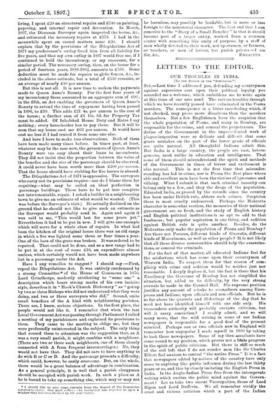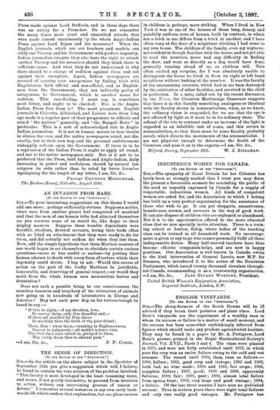LETTERS TO THE EDITOR.
OUR TROUBLES IN INDIA.
[To Till EDITOR OF VTR "SPxCTaTOS."] SIR,—Last time I addressed you, defending my countrymen against aspersions cast upon their political loyalty. you accorded me a welcome, which emboldens me to write again at this time of our sore need. The various troubles through which we have recently passed have culminated in the Poona murders. The consequence is a bitter race-feeling which, if not checked, may prove more disastrous than the murders themselves. Not a few Englishmen have the suspicion that the whole population of Poona, and many in Bombay, are responsible for the crime, and conceal the perpetrators. The duties of the Government in the unprecedented work of plague-inspeetion were so delicate and difficult that some grave mistakes on the part of the lower grade of officials are quite natural. All thoughtful Indians admit this. But India is a large country, the people are vast, hetero- geneous, most unlike in education and intelligence. That some of them should misunderstand the spirit and methods of the Government in times of terror and excitement is also natural. This is not the first time that misunder- standing has led to crime, nor is Poona the first place where able and excellent men have been the victims of ignorance and villainy. What I submit is that such criminal insanity can belong only to a few, and they the dregs of the population. Educated India, as proved by the records since the country has been under British rule, abhors such crimes. Suspicion there is most cruelly undeserved. Perhaps the Mahratta character is somewhat restless, the memories of their national government are so fresh, and the study of English history and English political institutions is so apt to add to that freshness ; but popular aspiration is one thing, and sedition against British rule is quite another. Besides, do the Mahrattas only make the population of Poona and Bombay ? Are there not Parsees, different kinds of Guzratis, different kinds of Mussalmans, as well as other people ? It is not likely that all these diverse communities should help the assassina- tions, or conceal the criminals.
For the fact of that matter, all educated Indians feel for the misfortune which has come upon their countrymen of Western India. To suspect them for that reason of corn. plicity with crime and sedition would be neither just nor reasonable. I deeply deplore it, but the fact is there that his Excellency the Governor of Bombay has not simplified the situation, but added to its difficulty, by the very strong avowals he made in the Council Hall. His supreme position justifies any amount of rebuke to wrongdoers among Euro- peans and Indians, upon officials and non-officials. But he is so far above the quarrels and ill-feelings of the day that he need not have identified himself with one side only. His tremendous authority will probably overawe criticism, but will it carry conviction ? I readily admit, and so will many more, that the wild writing in some of our Indian newspapers is responsible for a good deal of the present mischief. Perhaps one or two officials now in England will remember bow unpopular I made myself in 1886 by taking to task these newspapers. Some of my then assailants have come round to my position, which proves not a little progress in the spirit of public criticism. But there is still so much of the evil left that I do not wonder men like Sir Charles Elliott feel anxious to control " the native Press." It is a fact that newspapers edited by natives of the country have only come to anything like public influence during the last thirty years or so, and this by closely imitating the English Press in India. Is the Anglo-Indian Press free from the intemperate writing which excites the public mind against the Govern- ment? Let us take two recent Viceroyalties, those of Lord Ripon and Lord Dufferin. We all remember vividly the cruel and vicious criticism which a part of the Indian Press made against Lord Dufferin, and in those days there was an outcry for a Press-law. Do we not remember the many times more cruel and unmerited attacks tbat were made almost unanimously by the whole Anglo-Indian Press against Lord Ripon and his measures ? When the English journals, which are our teachers and models, can vilify one Viceroy and his Government with perfect impunity, Indian journalists imagine they also have the right to attack lnother Viceroy and his measures should they think there is sufficient cause. And what they do not understand is why there should be a charge of sedition against them and not against their exemplars. Again, Indian newspapers are accused of causing race antagonism by finding fault with Englishmen, both official and non-official, and as English- men form the Government, they are indirectly guilty of antagonism to Government, which is another name for sedition. This race-feeling, I must say, is sometimes most bitter, and ought to be checked. But is the Anglo- Indian Press free from it ? The most prominent English journals in Calcutta, Allahabad, and Lahore have from long ago made it a regular part of their programme to ridicule and attack " the natives " generally, and " the Bengali Baba " in particular. This is a sort of acknowledged rule in Anglo- Indian journalism. It is not in human nature to bear insults in silence for ever, and the native newspapers retort, not dis- creetly, but in their own way, and the personal embitterment unhappily reflects upon the Government. If there is to be a repression of the Indian Preis, it ought to apply all round, and not to the native newspapers only. But is it not to be preferred that the Press, both Indian and Anglo-Indian, daily increasing in power and usefulness, should by natural law outgrow its evils rather than be ruled by brute force ?— Apologising for the length of my letter, I am, Sir, Sze.,







































 Previous page
Previous page